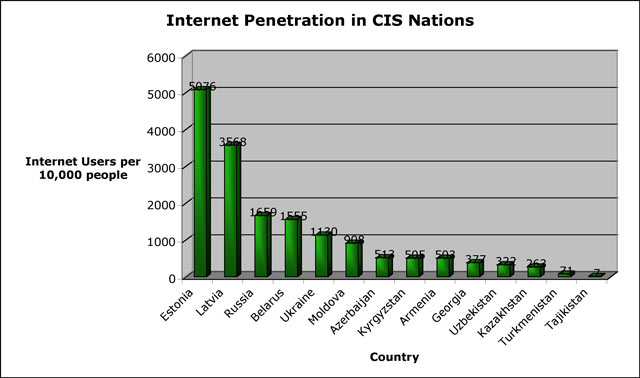This blog has not only provided me with a place to comment on Moldova and on Peace Corps service, but also a way to meet and communicate with some very impressive Moldovans who find me online. Conversation builds from a first e-mail or blog comment, and soon we are regularly checking each others' blogs, sending e-mails or meeting face-to-face.
Such has been the case with Irina Nicorici, a professor at the State Institute of International Relations. She was directed to my blog by a Fulbright scholar,
Chris Grant, and she e-mailed me asking if I could write for a publication her students were compiling. I declined, but passed her the names of some other interested volunteers, all of whom wrote in the newsletter. From that point, she has helped me in planning a sexual education seminar and in organizing my new project,
"Vocile Succesului," or "The Voices of Success".
The premise for Voices of Success is simple; Moldovan children, especially in the village, have few good role models in terms of career success. In the village of Mereseni, there are, by many villagers' estimates, fewer than 10 people in their 20s and 30s who were born in Mereseni and now have a good career. The majority of adults work in a job that doesn't pay enough for most of the year and often go to Russia, Italy or Spain to do manual labor that pays better than their Moldovan jobs. The majority of kids in my school have a relative working abroad. Even Mereseni's school director left to work a better-paying job in Italy. When the adult that school children are supposed to most revere leaves her job because she'll make more money cleaning houses in Italy, the system is profoundly out of whack.
Children who see this broken labor situation will emulate it in the future because it is what they perceive as normal. The goal of Voices of Success is to have the children meet people who were born in villages and are on solid career tracks. Any profession will do: economists, businessmen, doctors or, in the case of Irina Nicorici, university professors.
Irina was born in the northern village of Drochia and has participated in many national and international programs, including America's FLEX program, which sponsors students from the former U.S.S.R. to study for one year in an American high school. She came to the school Wednesday with a small entourage: two of her students, named Irina and Alina; Fulbright scholar
Ryan Kennedy and his wife,
Allison. With the exception of Irina Nicorici, this was the first time anyone in the group had been to a Romanian-speaking village, and for Ryan and Allison, it was the first time since they had arrived in Moldova a month ago that they had been outside of Chisinau. Needless to say, they had a lot of questions for me about village life, and Irina told me that her students were "freaking out a little" about being in a village where Russian was not the first language. I told them that not all of the students understood Russian that well, so they should try to do the majority in Romanian. Irina assured me that her students, who are, after all, linguists, would be up to the task.
We started our assembly at 1:15, when the approximately 200 students from grades 5-11 piled into the cafeteria/auditorium. I gave a brief introduction, then handed the reins to Irina and her posse.
Irina began by telling a Moldovan folktale about a boy who sat under a cherry tree one day. The boy wanted to eat some cherries (
visine, for those concerned Romanian speakers among you who want to tell the story in your own language), but he was so lazy that he would not even extend his arm to reach up and pick them from the tree. Instead, he just sat under the tree, tilted his head back and opened his mouth. The cherries never dropped, and he didn't get to eat any.
Too many modern Moldovans are like that boy, Irina said. To have success in life, you must be willing to extend your arm and put in the necessary effort to achieve your goals. Having set that as the framework for our talk, we set off on a long discussion. After the 45 minute period ended and the crowd seemed to have grown restless, I announced that those students who needed to go home now could. The noisier and less attentive half left, and those that remained discussed with our guests for another hour.
The topics were wide-ranging, and I was very impressed with both Irina's ability to steer the discussion and my students' ability to ask wonderful questions. Some of the topics we addressed in our non-formal discussion included:
- What three goals do you have in life?
- What is your ideal salary when you grow up?
- What is the right age to marry and have children? The consensus among students was that it was before 25, but I mentioned that my mom was 29 when I was born. One of my seventh-grade students asked me how to ask this in English, so he could say it to Ryan and Allison.
- Is it okay to disobey your parents if it's to fulfill your life goals?
- How is university life different from living at home? Irina's students were especially talkative on this issue.
- What does it mean to volunteer? Alina, one of the students, does a large amount of volunteer work, and was a good source and role model for the students.
- Do villagers have an obligation to return to their village after university to make it a better place? Svetlana, a 10th grader, got into a polite yet heated debate with Irina about this. Svetlana argued that villagers should help other villagers, since 50 percent of Moldova's population remains rural. I sensed some defensiveness from Irina, who returns to her home village about once a year and envisions living outside of Moldova in the future. Irina made the point, though, that if we improve ourselves, then we improve whatever place we live in, and the improvement will radiate from us. I don't know where I stand on this issue; I applaud any Moldovan who works a good job abroad and then returns to their country with the aim to help those around him, but I also don't think that any Moldovan should consider herself chained to her village or a poor country that is less than 15 years old.
Irina's students, as I implied earlier, are native Russian speakers. Their Romanian grammar was fine, but they were constantly scanning their brains for the correct word and checking with Irina if they had said it correctly. After 20 minutes of feeling insecure in their Romanian, they switched to Russian. They did it politely enough and asked the students if they could still understand. The students, wanting to be good hosts, said that they did. I asked one of my eighth graders next to me how much the students were actually understanding what was being said, and she guessed that it was about half.
Afterward, Irina described the language switch as "so Moldovan." It's certainly not American. I can't imagine a motivational speaker coming to an American school and switching to Spanish midway through because it was the language in which he could better express himself. But in Moldova, it works.
After the discussion ended, about 15 students asked for our speakers' names and contact information. It was at about that moment I realized I had forgotten my camera in my classroom, so I don't have any photographical evidence that anyone came to the school. Nevertheless, I was very happy with the turnout and the level of interest.
On Thursday, I began each of my classes by asking students what they thought of the assembly. They gave it a resounding thumbs-up, and gave some interesting feedback. Many of them thought Ryan and Allison were spectacular; odd, since Ryan talked for about five minutes and Allison didn't speak at all. One of my fifth graders liked Irina the best, since she "spoke our language". One of my seventh graders said she didn't think she could be happy with Irina's life, and that having a career shouldn't override having a family; I told her class that they will have to balance work and family for the rest of their lives. As homework for each class, I had them write (in Romanian) three goals for their lives. I'll find out in the next few days what kind of goals my students have.
Overall, I was blown away by the amount of discussion that we generated over the course of nearly two hours. I'm very thankful to all of our guests who came, and I'm proud of my students for asking such good questions and being much more interested than I ever was when a motivational speaker came to my middle school. I can't wait to have more of these next school year.


